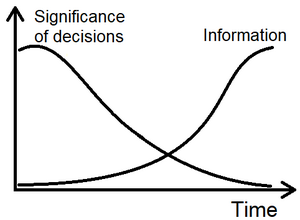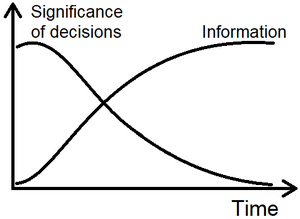The paradox of project planning from an uncertainty perspective
Developed by Freja Ejdrup Andersen, February 2022
One of the most difficult things to plan in a project is the uncertainty and the risk associated with it. When planning a project, decisions are often made in the early stages where there is a lot of epistemic uncertainty . To have a project run smoothly and keep the budget and overall deadlines, important decisions need to be made early in order to define a clear schedule. This can however not be made without knowledge. Further into the project process more information is available, but the decisions made in later stages are less important for the success of the overall project. This is what is known as the paradox of project planning. To help with this paradox different strategies can be used. Some of the key requirements to increase the knowledge in the beginning of the project include front-end loading with the involvement of experts and the postponement of the decision-making.
Contents |
What is the paradox of project planning?
The paradox of project planning is a project management model that connects the uncertainty or the significance of decisions with the available information about the project at a certain time. It states that the important decisions are made in the early stages of a project, where the level of epistemic uncertainty is high. Later in the process, more information is available, but the significance of decisions has decreased[1]. This relationship can be seen illustrated on Figure 1.

Strategies to cope with the paradox of project planning
Front-end loading
The principle of front-end loading comes from project management and refers to the process in which cost, and time is intentionally increased or allocated to the early stages of a project. This way the uncertainty of a project is rapidly decreased, and more informed decisions can therefore be made. This also minimizes the risk associated with the project and increases the potential for success [2]. The benefits and influence of this can be illustrated by the influence curve, seen on Figure 2.
By allocating cost, experts can be involved to further increase the knowledge of the project. Here a useful tool would be the learning plan.
The learning plan
The learning plan creates an overview of the project and helps to identify where there is a lack of knowledge and in turn where it would be wise to involve the appropriate experts when it comes to these shortcomings. The learning plan is divided into two sections: The learning loop and evaluation. The learning loop should assess the uncertainties regarding market, technology, resources, and organization. Here it is important to identify the knowns and unknowns of the project and assess how to acquire the appropriate knowledge. The evaluation should be used to review the outcome of the learning loop and define new learning requirements for the project [3]
Postpone decision-making
Limitations and pitfalls
Relative wiki articles
- Epistemic vs. Aleatory uncertainty, link: Epistemic vs. Aleatory uncertainty. This page elaborates the definition and the difference between Epistemic and Aleatory uncertainty. It defines the cause of the uncertainties, categorizes types of decisions and how they affect project, program and portfolio management.
- Learning plan, link: Learning plan. This page goes into detail about the learning plan, how to use it and what the benefits and limitations of the tool.
References
- ↑ 1.0 1.1 , Olsson, N. O. E. & Samset, K. (2006). Front-end management, flexibility, and project success. Paper presented at PMI® Research Conference: New Directions in Project Management, Montréal, Québec, Canada. Newtown Square, PA: Project Management Institute.
- ↑ , Ebert, J. (2013). The Right Tools For The Job: Front-End-Loading. Paper presented in Manufacturing.net
- ↑ , Fritz, J. (2021). Learning plan. link: Learning plan
